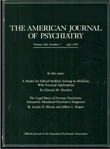I reviewed the first volume of
How Psychiatrists Look at Aging for the
Journal in 1993 (
1). I found it charming, giving insights into the functioning in old age of 15 psychiatrists, most of whom were psychoanalysts.
In volume 2, we now have 19 psychiatrists, again mostly psychoanalysts, but this time no women are included. Among the 13 contributors whose age could be approximated from the context, the range was 65 to 85 years (the mean was 74 and the median was 75). Two have died—Stuart M. Finch and Martin Grotjahn.
The editor gave each contributor the freedom to be either autobiographical or impersonal. The latter predominated as general advice. (Pollock had hoped for a bit of humor.) According to the editor's introduction, they all treated old age as a stage of development.
All of the contributors still had patients and students, but most had given up the onerous aspects of academic administration and politics. None of them considered retirement a blessing.
In contrast, I have recent written and telephone reports of the oldest living graduates, including myself, from the University of Chicago's medical school. The age range of these graduates was 70 to 96, the average 84. A few of these graduates were psychiatrists who were still working a little, but several of the female psychiatrists had happily retired. In general, surgeons retired in their early 60s, internists in their late 60s. Most of the University of Chicago group reported that they were enjoying retirement in literary or artistic pursuits, gardening, travel, golf, or just observing grandchildren.
In their own words or in paraphrases of their words, the contributors to volume 2 of How Psychiatrists Look at Aging offer the following:
Louis A. Gottschalk: Kinship relationships and activities place first in priority, contributing to the quality of life. Presumably this is true of most older people.
Stuart M. Finch: By 7 or 8 years, children who are seriously obsessive-compulsive have begun to “age.” When interviewed later as adults, they resentfully say they were never children. They are likely to enforce adult behavior on their own immature offspring.
Paul L. Adams: Old age is interplay of detachment and involvement; conservatism and radicalism; lust intact and sexuality decreasing.
Alex H. Kaplan: “I still have goals and projects to accomplish. They are not as urgent as they were but without them I would certainly be depressed.”
C. Knight Aldrich: “Too often recent memory loss in the therapist makes stereotyping the patient easier. With our increasing trouble processing new information, we rely on past concepts not always relevant.”
Robert Lippert: As an advocate for psychotherapy for the aged, he says, “No jargon needed. Simply understand how the older person feels and conduct yourself with due consideration for the validity of these feelings. Be emphatic rather than overly sympathetic.”
Klaus D. Hoppe: “The understanding we share with our patients is tentative; they must be made aware of this.”
Martin Grotjahn: Having always had doubts about the libido theory, he now, with Wallerstein, considers the ego's relation-seeking the central motivational lever of mental functioning.
Stephen Fleck: Having lost his beloved wife after 47 years of marriage, he says, “The saddest event associated with aging is widowhood. Having nobody to care for daily or nightly and intimately constitutes a painful, ever-present void.”
Samuel Eisenstein: “Very few specialties in medicine require so few physical skills as does our specialty. The brain is our major tool. If our brain functions well and our hearing is still good (or enhanced with a hearing aid), psychiatrists can work until advanced old age, more so than other doctors.”
Jarl E. Dyrud: “Some detachment does take place as we grow older. Is it anticipation of the approaching end, or is it wisdom and cynicism?”
Nathan P. Segel: There is sexuality in the aged “where they are not inhibited by lack of a suitable partner or cultural inhibitions or even prohibitions that often exist in institutional settingsEven grown children deny that their parents have sexual impulses.”
Earl J. Simburg: “Sex is an ongoing enjoyment. There are problems in the older years just as there are in any stage of development. What had been of concern about parental disapproval in the early years may be experienced as adult children's disapproval in these later years.”
Roy M. Whitman: He won a tennis tournament at age 65; he avers that a second marriage can be better than the first.
Stanley H. Cath: A professed humanist, he still does home visits and nursing home consultations in his late 60s. He developed a veneration for the aged and wise in early life.
Mortimer Ostrow: “Aging is an ordeal for all who reach those ages at which important functions fail. Much unhappiness is based on the mental attitudes that anticipate or follow these changes.” “Hanging on when retirement is appropriate earns dislike, disrespect or contempt.”
Peter Hartocollis: “When amnesic persons are depressed or anxious, it is only because they are not yet completely amnesic.” “An older man who rarely has erotic dreams may still be daydreaming about falling in love.”
Haskell F. Norman: “Many years in advance funds should be set aside for successful retirement.” He is a bibliophile and recommends early source books on gerontology. “Faced with lingering, painful, incapacitating illness, one would like the option to have life terminated by morphine.”
Two analytic psychiatrists describe ECT and insulin shock treatment as “primitive” and “disastrous” without adding what was good about both.
Both volumes of How Psychiatrists Look at Aging are easy to read. In them, our colleagues let us look into their lives and hearts.

